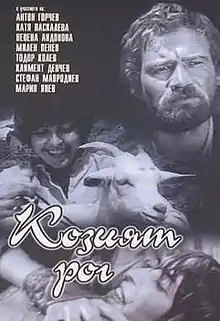The Goat Horn
The Goat Horn (Bulgarian: Козият рог, translit. Koziyat rog) is a 1972 Bulgarian drama film directed by Metodi Andonov, starring Anton Gorchev and Katya Paskaleva.[1] The film is set in 17th Century Bulgaria where Kara Ivan's wife is raped and killed by four local Ottoman feudal masters. Having disguised his daughter as a boy, and trained her in the masculine art of warfare over a period of ten years, they set out to take revenge.
| The Goat Horn | |
|---|---|
 Film poster | |
| Directed by | Metodi Andonov |
| Written by | Nikolai Haitov |
| Produced by | Nikola Velev |
| Starring | Anton Gorchev Katya Paskaleva |
| Cinematography | Dimo Kolarov |
| Edited by | Evgeniya Radeva |
| Music by | Mariya Neykova |
| Distributed by | Bulgarian Cinematography Studios of Feature Films Film Unite Mladost (uncredited) |
Release date |
|
Running time | 100 minutes |
| Country | Bulgaria |
| Language | Bulgarian |
The film won a Special Prize of the Jury at the Karlovy Vary International Film Festival.[2] The Goat Horn was selected as the Bulgarian entry for the Best Foreign Language Film at the 45th Academy Awards, but was not accepted as a nominee.[3]
Cast
- Katya Paskaleva as Maria
- Anton Gorchev as Kara Ivan
- Milen Penev as The sheep herder
- Todor Kolev as Deli
- Kliment Denchev as Turkish man
- Stefan Mavrodiyev as Mustafa
- Nevena Andonova as Maria (as a child)
- Marin Yanev as Rapist
- Krasimira Petrova as Mustafa's lover
Reception
According to the Spanish journalist Moncho Alpuente,[4] due to the sexual repression in Francoist Spain, arthouse cinemas were frequented by people expecting to watch more skin than what censorship allowed in commercial theaters. As a result, The Goat Horn was a box-office hit in Spain since the censorship board had allowed sexual scenes.
See also
References
- "The Goat Horn". mubi.com. Retrieved 30 November 2011.
- Karlovy Vary International Film Festival 1972
- Margaret Herrick Library, Academy of Motion Picture Arts and Sciences
- (in Spanish) 100 españoles y el sexo, quoted in La película erótica que burló la censura sexual del franquismo, Henrique Mariño, Público, 24 April 2017.